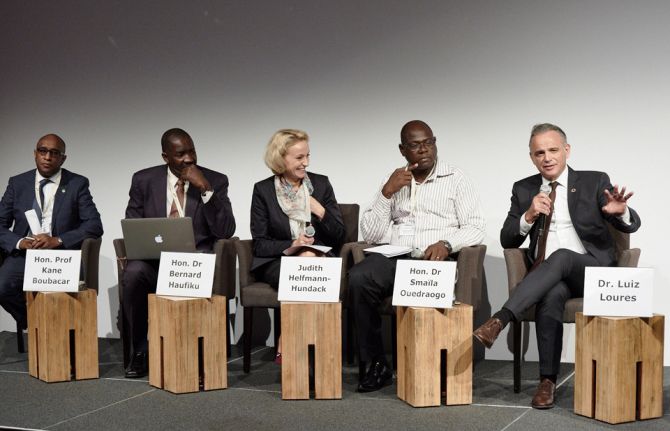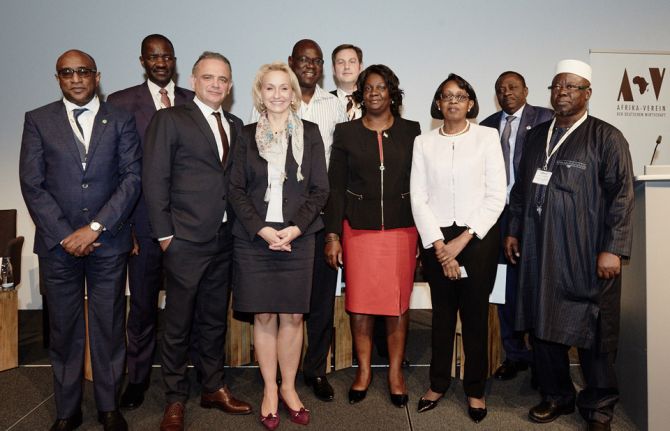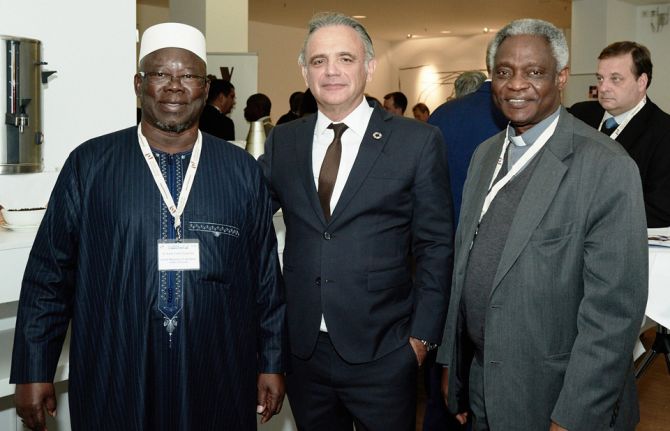



Debrief
Partnerships, investment and education highlighted at German–African Healthcare Symposium
14 October 2016
14 October 2016 14 October 2016Active collaboration between governments, civil society, faith-based institutions and private companies is essential in order to revolutionize and improve health care in Africa, according to participants in the third German–African Healthcare Symposium in Berlin, Germany. This work needs strong coordination and active advocacy from institutions such as UNAIDS, the symposium was told.
Representatives of German companies, faith leaders, ministers of health and academics gathered to explore ways to achieve the Sustainable Development Goals on health, which include as a target ending the AIDS epidemic by 2030.
The participants agreed on the need for significant innovation and partnership across a range of issues, including capacity development, access to services and strengthening systems for health. They also highlighted the active role played by faith-based institutions in the delivery of services and emphasized the importance of educating and empowering young people, women and girls in particular, while ensuring that no one is left behind in the response to HIV and other health needs.
Thomas Silberhorn, Parliamentary State Secretary in the German Federal Ministry of Economic Cooperation and Development, said that his government is actively looking for ways to encourage German companies to invest abroad. He reinforced to the many companies attending the event that trade alone was not sufficient and that it was necessary to actively invest in the health sector in Africa, including in education and professional training and in strengthening basic health services. While noting that Germany would not subsidize investment, he encouraged African countries to explore ways to increase their domestic health resources.
Roland Göhde, Chairman of the German Healthcare Partnership, also called for improved and increased training, education and capacity-building in Africa. Mr Göhde emphasized five areas of focus necessary to end the AIDS epidemic and reach the Sustainable Development Goals: communication, cooperation, coherence, coordination and culture.
UNAIDS Deputy Executive Director Luiz Loures described the AIDS response as a pathfinder that can help partners improve health-care overall. He noted the need for improved access by all people to essential services and that this relied on equity and human rights. This means finding ways to reach people and deliver health care where they live and work.
Participants
The event was attended by ministers of health from Burkina Faso, Cameroon, Mauritania, Namibia and Rwanda, and the Deputy Minister of Health of Sierra Leone, in addition to senior German political and private sector representatives.
Matshidiso Moeti, Regional Director for Africa at the World Health Organization, provided a keynote address following opening statements by Christoph Kannengießer, Chief Executive Officer of the German–African Business Association, and Roland Göhde, Chairman of the German Healthcare Partnership.
Faith-based institutions were represented by Cardinal Turkson of the Pontifical Council for Justice and Peace at the Vatican and El Hadj Cissé Djiguiba, Imam of the Grand Mosque of Abidjan.
UNAIDS Deputy Executive Director Luiz Loures provided a high-level outlook for the African health-care sector, while senior executives of German companies active in prevention, diagnostics, treatment and insurance joined in discussions with civil society, researchers and international organizations.
Key messages
- The participants called for active dialogue and collaboration among the diverse stakeholders.
- Private companies have a variety of roles to play, including logistics. For example, supermarket supply chains can also be used to improve the availability and lifespan of medical supplies and prevent theft.
- Governments rely on others to support HIV testing and counselling services.
- It is important for governments to be strategic and determine their own needs first, before seeking assistance, in order to avoid being distracted by new proposals.
Quotes
“THE ENGAGEMENT OF OUR ECONOMY HAS TO GO BEYOND TRADE. WE NEED INVESTMENT IN OUR PARTNER COUNTRIES, BECAUSE INVESTMENT IS THE ONLY WAY TO CREATE JOBS AND ENGAGE YOUNG PEOPLE AND ADMINISTRATIONS IN JOINT STRATEGY.”
“THE AFRICAN LANDSCAPE IS CHANGING AND WE NEED A NEW BUSINESS MODEL FOR ACCESS TO HEALTH CARE. WE NEED TO WORK WITH FAITH-BASED ORGANIZATIONS THAT DELIVER SERVICES. WE NEED TO WORK WITH COMMUNITIES TO UNDERSTAND THEIR NEEDS. AND WE NEED TO WORK WITH THE PRIVATE SECTOR TO EXPLORE NEW WAYS TO INNOVATE IN HEALTH.”
“A GENUINE DIALOGUE BETWEEN POLITICS, SCIENCE AND BUSINESS CAN ACHIEVE SIGNIFICANT RESULTS, BASED ON THREE PRINCIPLES: SOLIDARITY, SUBSIDIARITY AND A CONCERN FOR THE COMMON GOOD OF ALL.”
“WE HAVE TO SUPPORT OUR WIVES, OUR SISTERS, OUR DAUGHTERS, IN THE FIGHT AGAINST GENITAL MUTILATION, CHILD MARRIAGE AND FORCED MARRIAGE, AND WE HAVE TO INCLUDE YOUNG PEOPLE IN THE DEVELOPMENT OF OUR SOCIETIES. WE HAVE TO TALK TO THEM AND GIVE THEM INFORMATION ABOUT DISEASES.”
“PEOPLE CAN AFFORD A MOBILE PHONE, BUT THEY NEED TO BE CONVINCED WHY THEY SHOULD CONTRIBUTE TO HEALTH INSURANCE. NOW LESS THAN 20% OF OUR POPULATION IS COVERED BY HEALTH INSURANCE AND WE PROPOSE TO HAVE HALF COVERED WITHIN FIVE YEARS.”
“WE NEED TO REVIEW HOW WE SPEND BUDGETS AND USE AVAILABLE BUDGETS. WE SHOULD HAVE OUR OWN SOURCE OF FUNDING. WHEN SOMEONE IS HELPING TO CLEAN YOUR BACK, YOU SHOULD ALSO CLEAN YOUR FRONT.”
“WE REALLY NEED COMMUNICATORS AND COORDINATORS ON AN INTERNATIONAL LEVEL, LIKE UNAIDS, AND THEY SHOULD BE SUPPORTED MUCH STRONGER BY OUR GOVERNMENTS.”
“HEALTH CARE IS A GROWING MARKET. THE SUSTAINABLE DEVELOPMENT GOALS ARE AMBITIOUS, BUT THEY ARE ALSO AN OPPORTUNITY FOR COLLABORATION BETWEEN GOVERNMENTS, THE PRIVATE SECTOR AND CIVIL SOCIETY.”



